12. GLORY

THE LAST DAYS OF THE GILDED AGE
GERMANY
CONTENTS
 The (Second) German Empire or Reich The (Second) German Empire or Reich
 The Kulturkampf struggle between The Kulturkampf struggle between
Church and secular State
 Bismarck and the Social Democrats Bismarck and the Social Democrats
(Marxists)
 Bismarck and Wilhelm II Bismarck and Wilhelm II
 Wilhelm and the shift in German foreign Wilhelm and the shift in German foreign
policy
 Germany ... around the year 1900 Germany ... around the year 1900
The textual material on page below is drawn directly from my work
A Moral History of Western Society © 2024, Volume Two, pages 47-51.
THE (SECOND) GERMAN EMPIRE OR REICH |
The
German Empire that Bismarck had assembled under the Prussian monarchy
contained 27 distinct political units: four kingdoms, twelve duchies,
seven principalities, three cities, and the imperial territory of
Alsace-Lorraine. At the heart of the Reich stood Prussia, the
largest of the kingdoms in extent and population. The King of
Prussia was thus also the Emperor who symbolized the union. But
in addition to the imperial head, holding the whole thing together were
the legislative institutions of the Reichstag (its representatives
voted on by all adult German males) and the Bundesrat (with
representatives sent by the 27 states) ... and a supreme court, the
Reichsgericht. Eventually both a criminal law and a civil law
code would be put into effect on a uniform basis throughout Germany.
Of course also holding it together was the pride of the German people
who, having suffered for centuries the indignities of being considered
something of a political and cultural backwater, sensed keenly the
rapid rise of their new nation as a great European power. For
that they had Bismarck to thank.
|
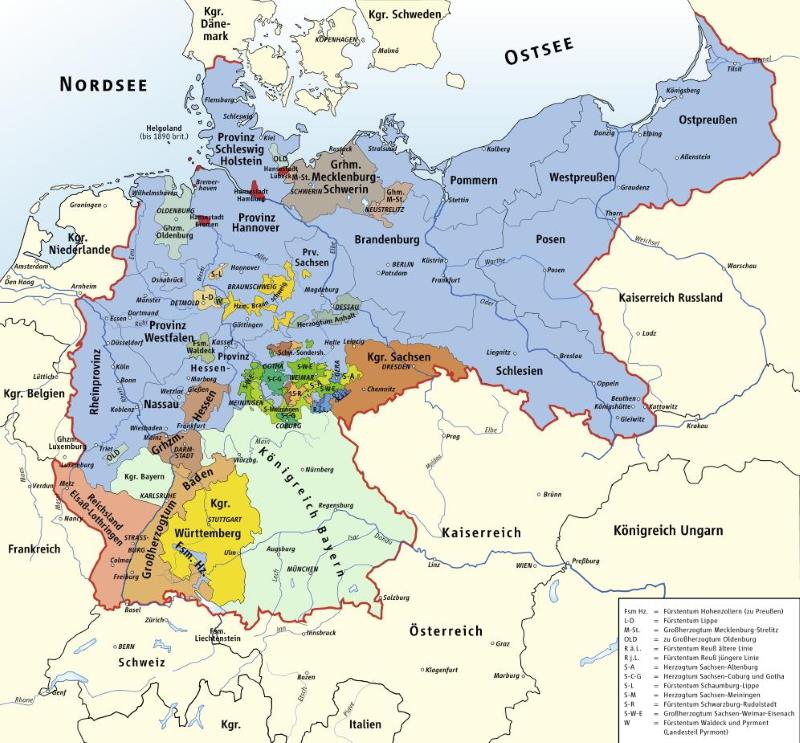
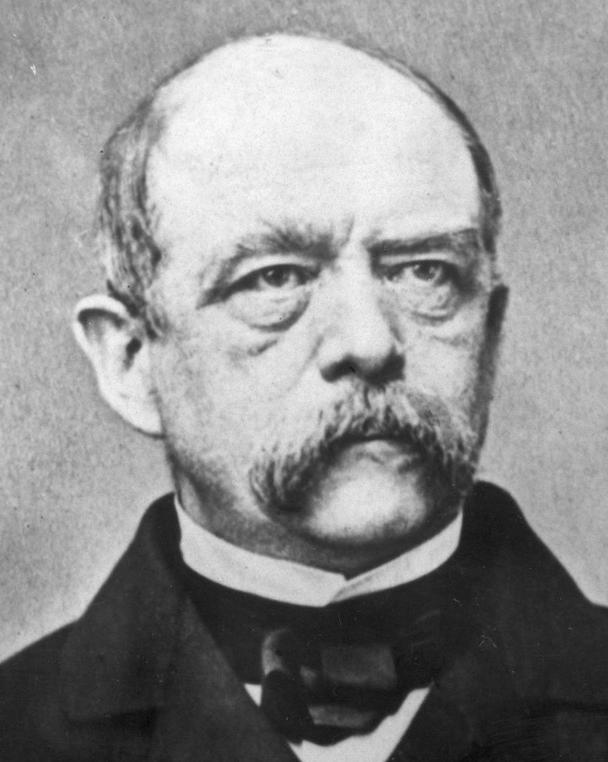
Bismarck
THE KULTURKAMPF STRUGGLE BETWEEN CHURCH AND SECULAR STATE |
But
not all went smoothly at first for Bismarck or the German people with
respect to their new domestic politics. The Roman Church had been
humiliated in the loss of its lands to the new Italian state ... and
sought to recover some its stature with the new declaration (1870) of
the infallibility of the pope. The Church proclaimed that in all
matters of faith and morals the pope’s pronouncements were totally
infallible ... thus not subject to change or even question within the
church. Not all German Catholics were happy about this new dogma
and their protests were heard in Rome ... and met by a demand from the
pope to the Prussian government to remove these individuals from all
positions of authority in schools and universities, and even in the
German churches. This was something that Bismarck was not about
to do, seeing in it the revival of the old investiture
controversy. He informed Rome that the German emperor had no
intentions whatsoever to ever again "go to Canossa"1 physically or
spiritually. A church- state battle of sorts was now on in Germany.
But there were numerous German Catholics willing to join with the pope
and Vatican in their support of the views of the Catholic Church.
In the Reichstag a large group of such Catholic representatives formed
themselves into the Center Party (very conservative, but seated at the
center of the array of representatives in the Reichstag). Their support
of Rome Bismarck interpreted as a challenge to the German nation
itself. He thus led the German parliament to pass a number of
laws putting various restrictions on religious education, on the
selection and functioning of the clergy, and on marriages (requiring a
civil ceremony).
The net result for Bismarck was not what he was
hoping for ... because in the next elections the Center Party increased
its seating in the Reichstag significantly. Bismarck, being ever
the intuitive politician, recognized his loss in this matter and began
to back down on the various restrictions ... and the Kulturkampf
gradually died away.
1In
reference to the event of 1077 when Holy Roman Emperor Henry IV went
barefoot in the snow to Canossa Castle to ask forgiveness of the Roman
Pope Gregory VII ... for Henry's earlier political challenge to the
papacy.
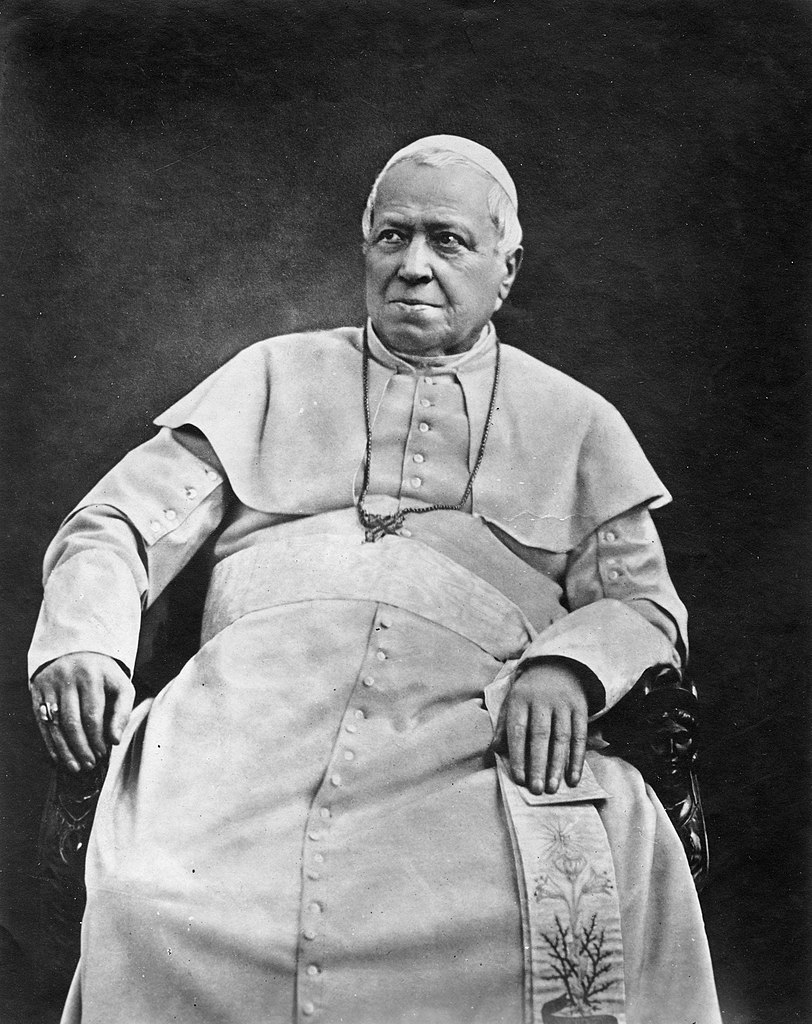
Pope Pius IX - 1875 (Pope: 1846-1878)
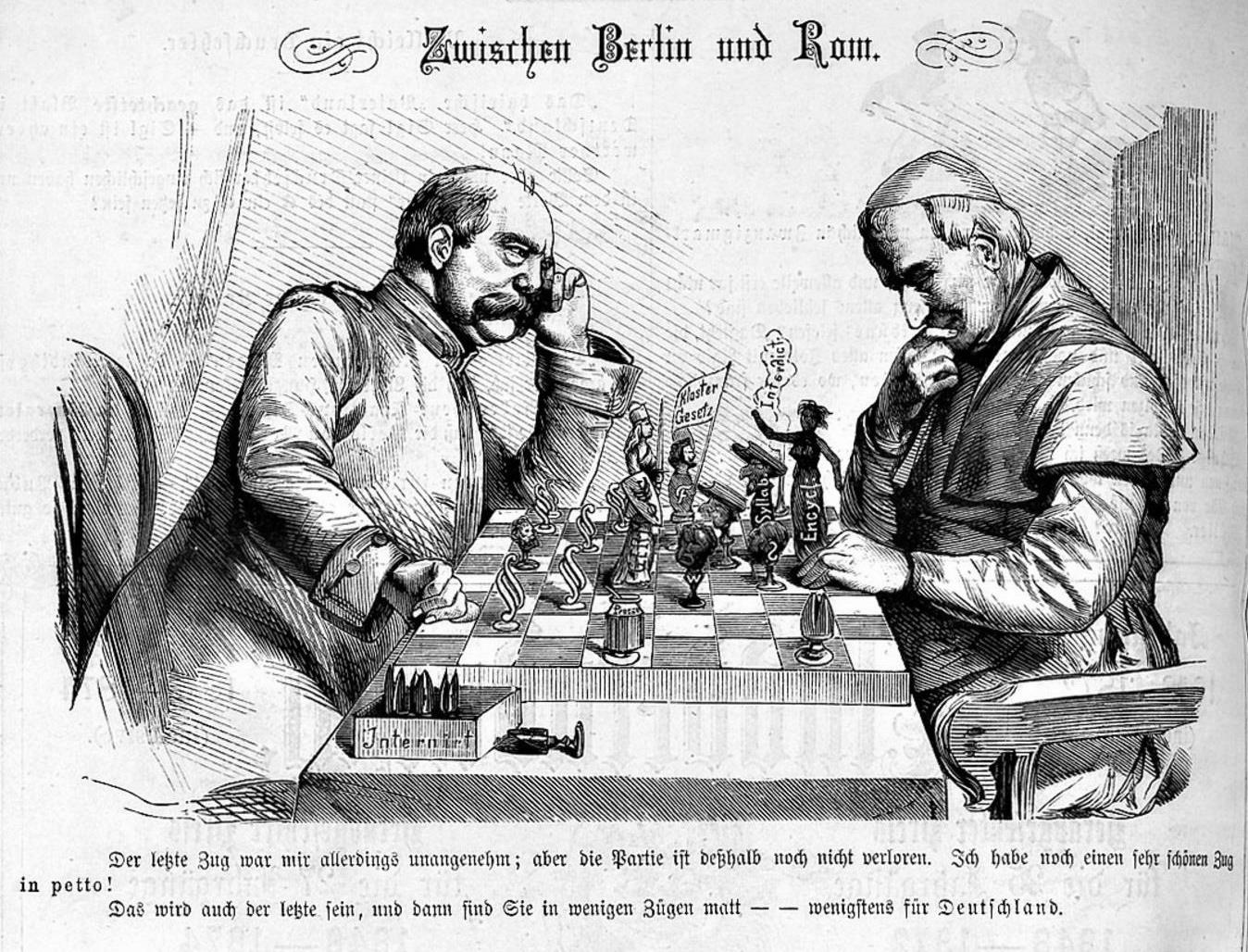
"Between Berlin and Rome"
Pope Pius: "The last move was for me certainly unpleasant; but the game is not yet lost. I have one more very excellent hidden move!"
Bismarck: "It will also be the last, and then you will find yourself checkmated in a few moves ... at least for Germany." |
BISMARCK AND THE
SOCIAL DEMOCRATS (MARXISTS) |
Germany’s move into
the industrial age was phenomenal. In short order during the last
quarter of the 1800s Germany moved from being a mostly agricultural
society to being the largest industrial society on the European
continent. Industrial towns exploded with growth and activity ...
changing the demographic character of the German society just as
quickly. And with that rapid change went all sorts of issues,
economic, social and political. One of these was the rapid growth
of Socialist political parties representing the interests of the
fast-growing industrial working class. From such groupings would
eventually emerge the rapidly growing Social Democratic Party.
Bismarck decided to meet the Socialist challenge by clamping down on
their party's ability to meet and organize ... and at the same time
trying to steal their thunder by sponsoring a number of state programs
similar to those advocated by the working class parties: workers'
compensation for sickness and injury on the job, insurance for
surviving relatives of a worker killed on the job, and old age
pension. Bismarck blended funding from the state, from the
industrial companies and from the workers themselves to finance these
programs.
But whereas Bismarck’s own social programs were well received by the
workers, they did little to undercut the popularity of the Social
Democrats. Just as with his struggle with the Catholics,
Bismarck, realizing that his strategy had gained him little, backed
away from his program ... at least with respect to the clamping down on
the politics of the workers' organizations. But when this easing
up on the oppression yielded no positive results, he then reversed
course a second time and came back hard on those organizations.
This would ultimately become part of what would create a political
distancing between him and the young German emperor Wilhelm II.
|
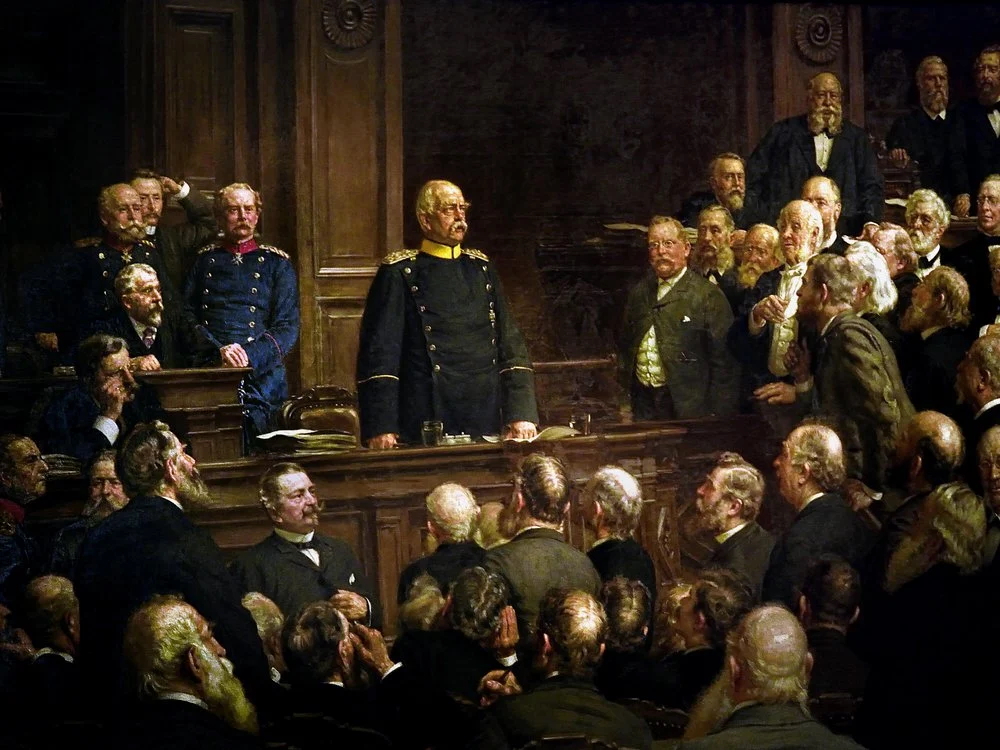
Bismarck addressing the German Reichstag
In 1888 a 29-year-old Wilhelm took
command of Prussia and the German Reich when his grandfather died ...
and then his father also died only three months later. Wilhelm
was physically very energetic and had a very quick mind.
Unfortunately, this would prove to be a major disability because
Wilhelm trusted himself to be quicker than others in understanding a
situation ... and thus did not tend to check things out deeply before
acting.
Bismarck, who was long used to Wilhelm I allowing him to govern
Germany, found himself up against the young emperor who intended to
rule Germany directly. Wilhelm did not want the strong-willed
Bismarck to get in his way. They disagreed sharply over how to
handle the Socialists (Wilhelm at first wanting to take a much softer
approach to them) and whether the cabinet ministers were to report
directly to Bismarck or Wilhelm. Bismarck used to get his way
with the old emperor by threatening to resign, backing down the emperor
every time. But this tactic backfired on Bismarck when such an
event in 1890 ended up with Wilhelm accepting his resignation!
The Bismarck era in Germany thus came to an abrupt end. A new one
under Wilhelm II was about to unfold.
|
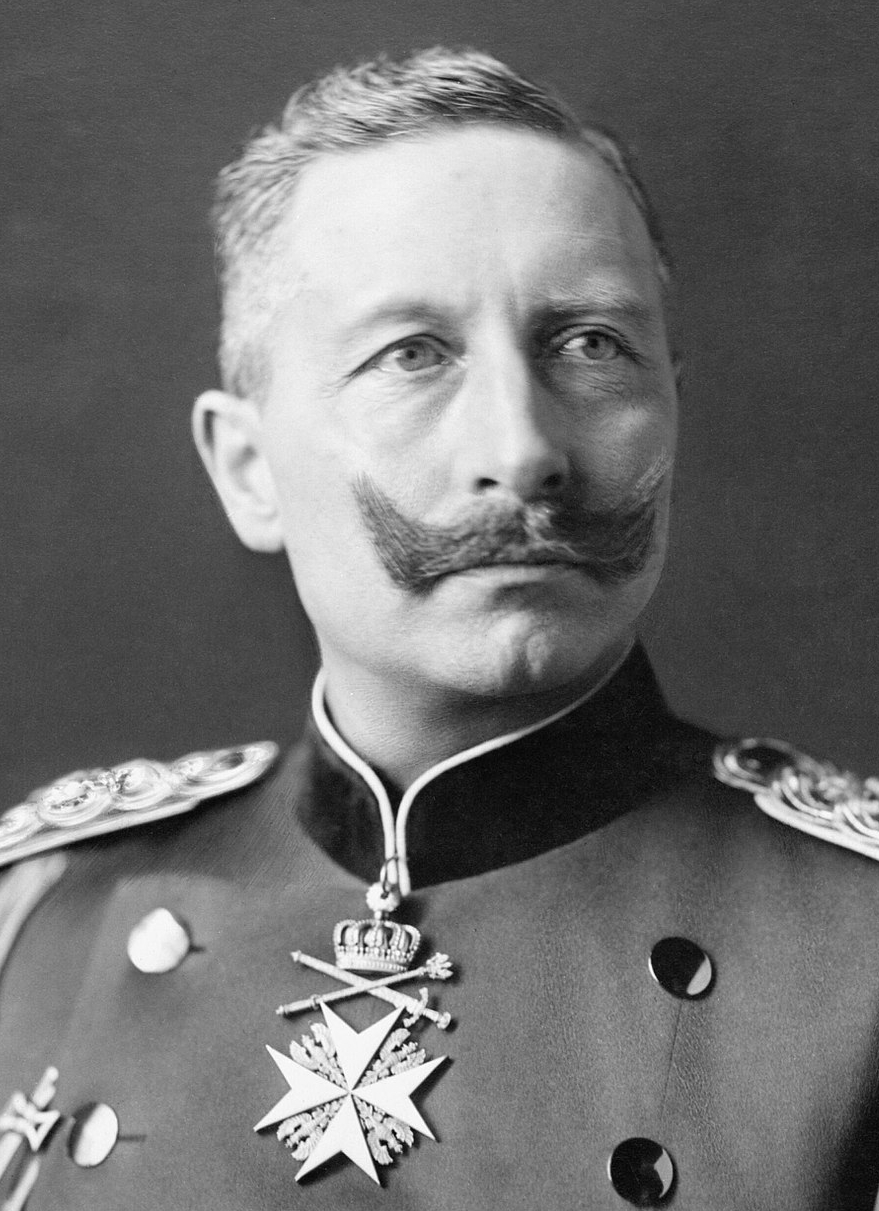
German Emperor (Kaiser) Wilhelm
II
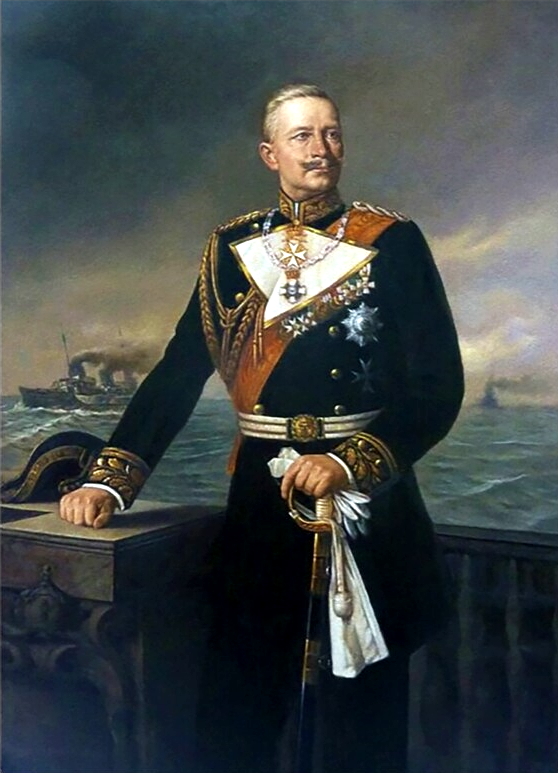
Wilhelm posing as a naval officer
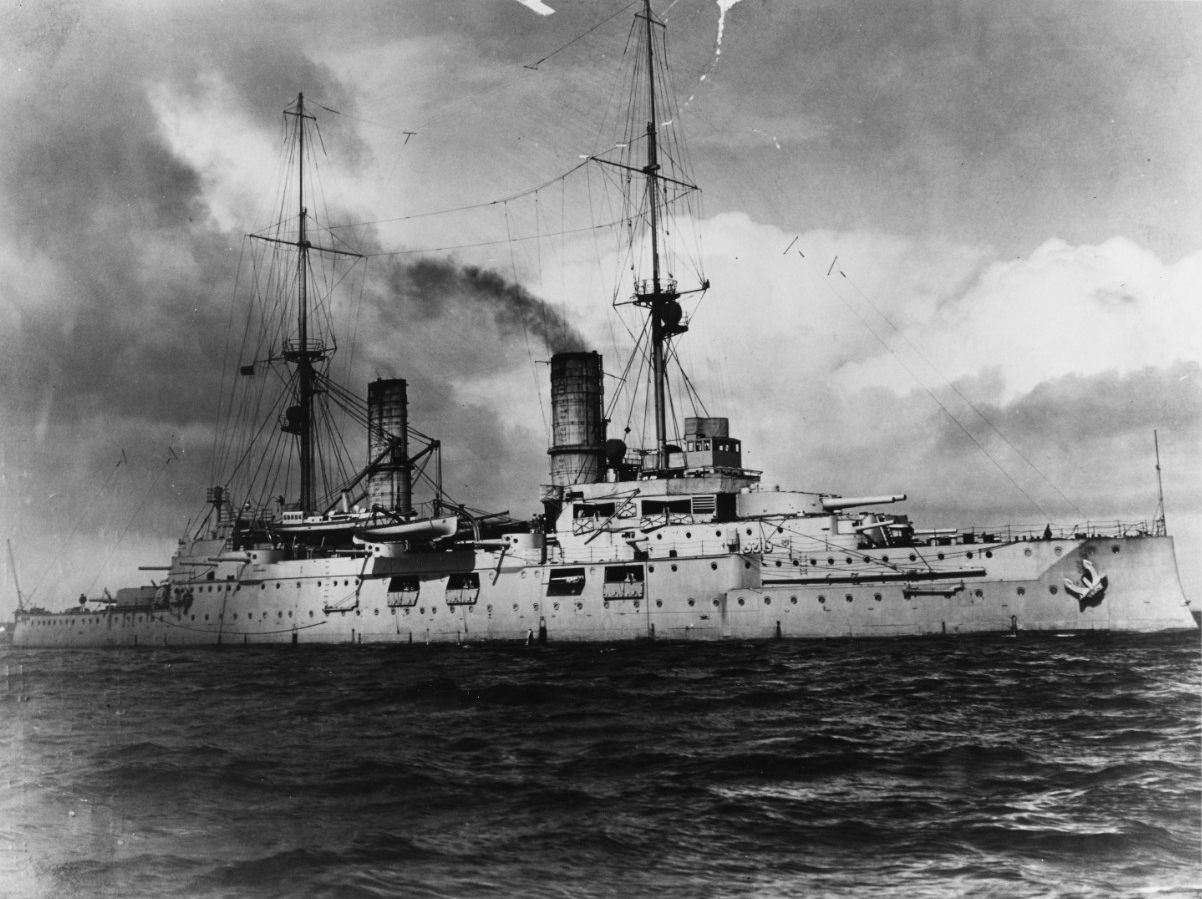
The Battleship Kaiser Wilhelm (1897-1921)
WILHELM AND THE SHIFT IN GERMAN FOREIGN POLICY |
Wilhelm and the shift in German foreign policy. On two other
accounts Bismarck and Wilhelm II had disagreed sharply. Wilhelm
was very interested in getting Germany involved in the game of European
imperialism. Bismarck had thought such imperialism to be
unnecessary and needlessly very expensive ... costing Germany vastly
more than it yielded in benefits (Bismarck proved ultimately to be
absolutely correct on this point). Of course to play the overseas
game, a player needed a top-rate navy ... another matter for which
Bismarck could see no particular benefits, especially given the cost
involved. Wilhelm had disagreed vehemently and with Bismarck gone
he proceeded to create a German navy that was second in size only to
the British navy.
As for the British, their navy was considered vital to their nation’s
survival. They could see no similar need for such a huge German
navy and became ever more suspicious of Wilhelm’s goals.
Wilhelm also took the attitude that the German military needed to be
strengthened even more than it had been under Bismarck ... claiming
that this was the only way to guarantee Germany would never be
attacked. Bismarck had been careful about how he sized German
power, aware that too much buildup would merely lead other European
nations to do the same ... leading to the greater possibility of an
unplanned diplomatic catastrophe. Bismarck relied more on
diplomatic skill than brute power. For Wilhelm, however, things
were exactly reversed: Wilhelm was uninterested in diplomacy and keen
on a buildup and demonstration of brute German power.
Here too, Bismarck would soon prove to have
been the wiser in the design and use of German power. France
immediately sensed a major threat coming again from Germany ... and
began to react accordingly.
|
GERMANY ... AROUND THE YEAR 1900 |
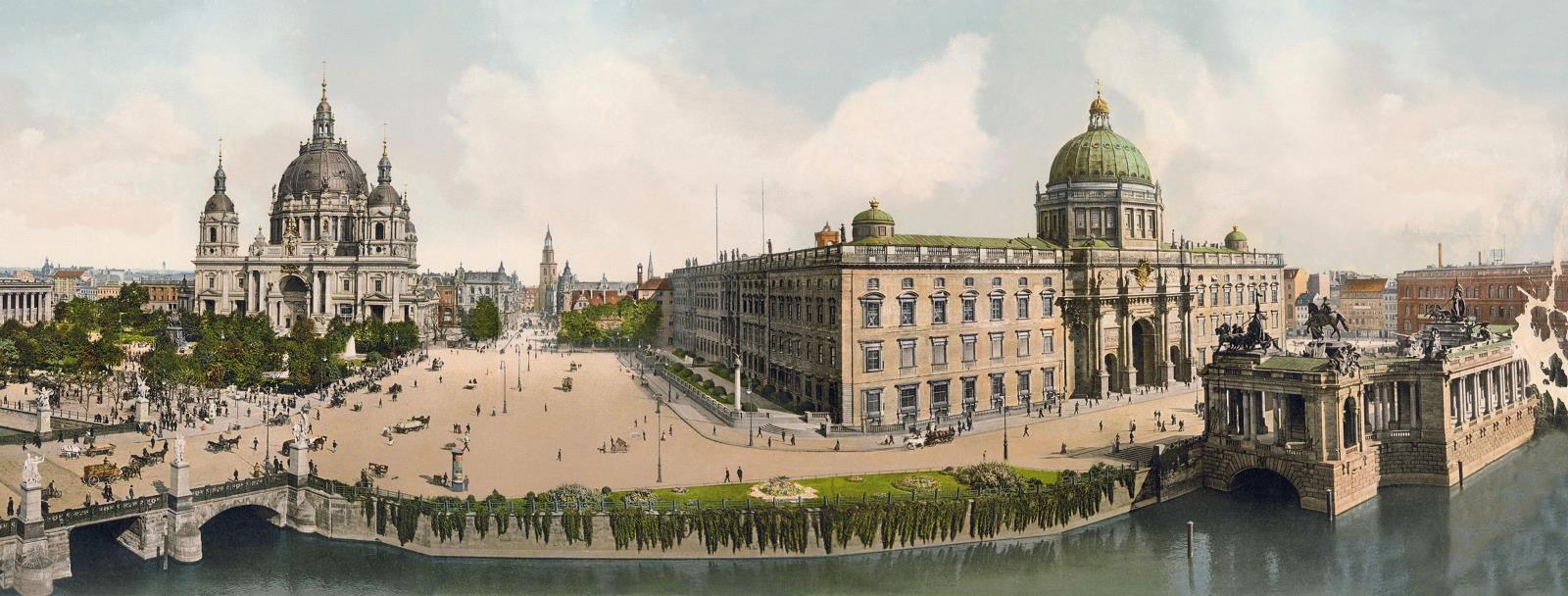
Berlin - The Berlin Cathedral and the City Palace
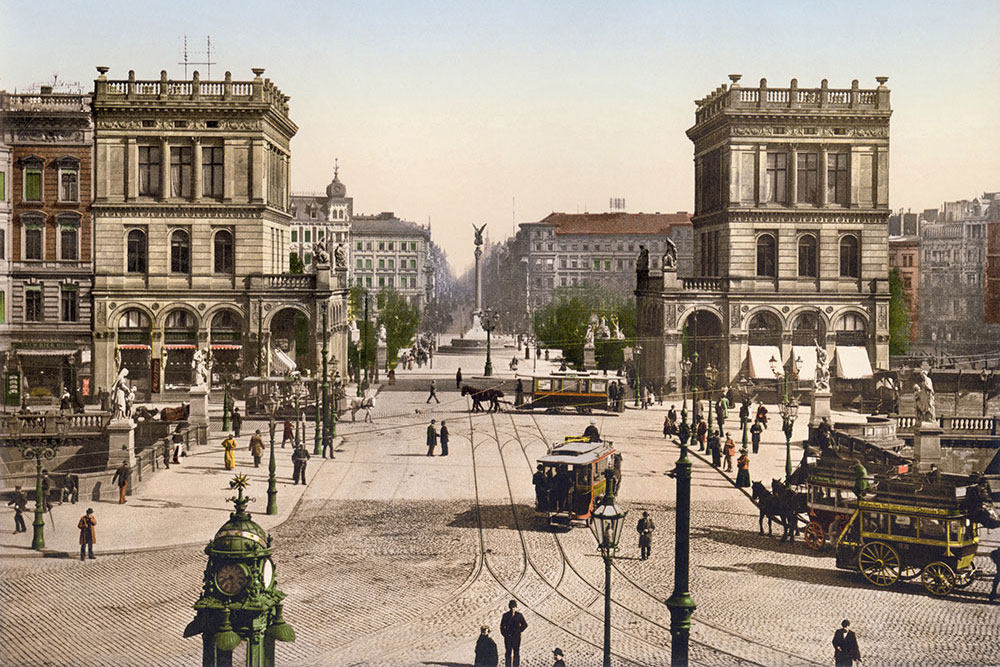
Berlin - The Hallesches Tor at the Landwehr Canal
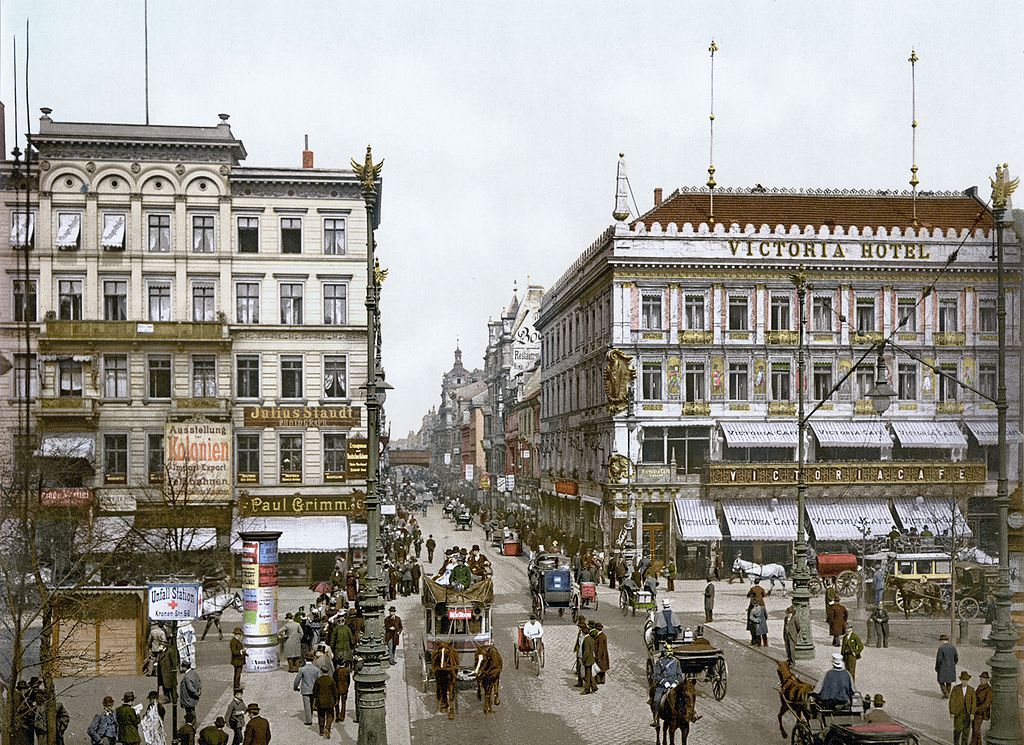
The Berlin boulevard Unter den Linden and the Victoria Hotel
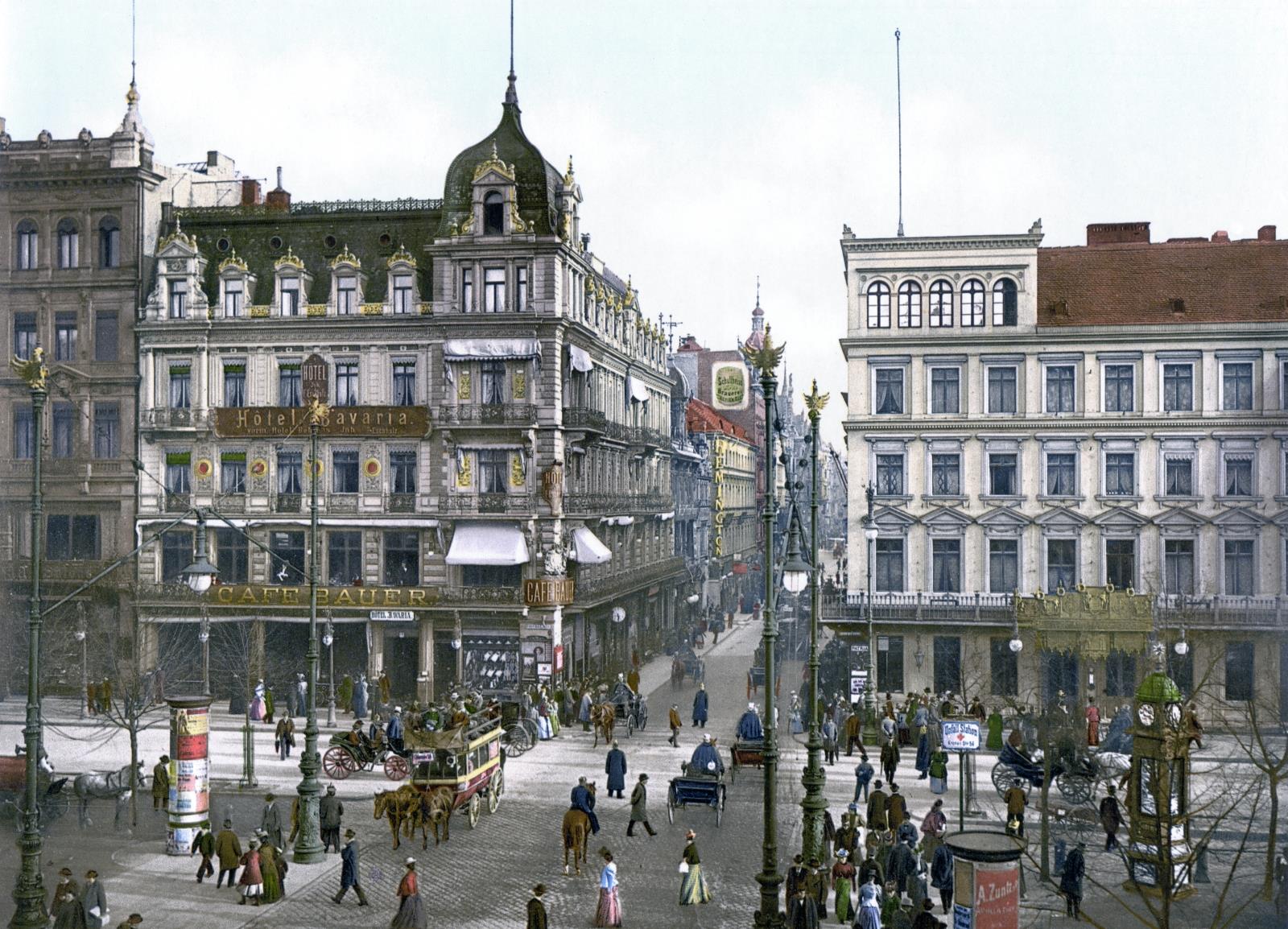
The Berlin boulevard Unter den Linden and the Cafe Bauer
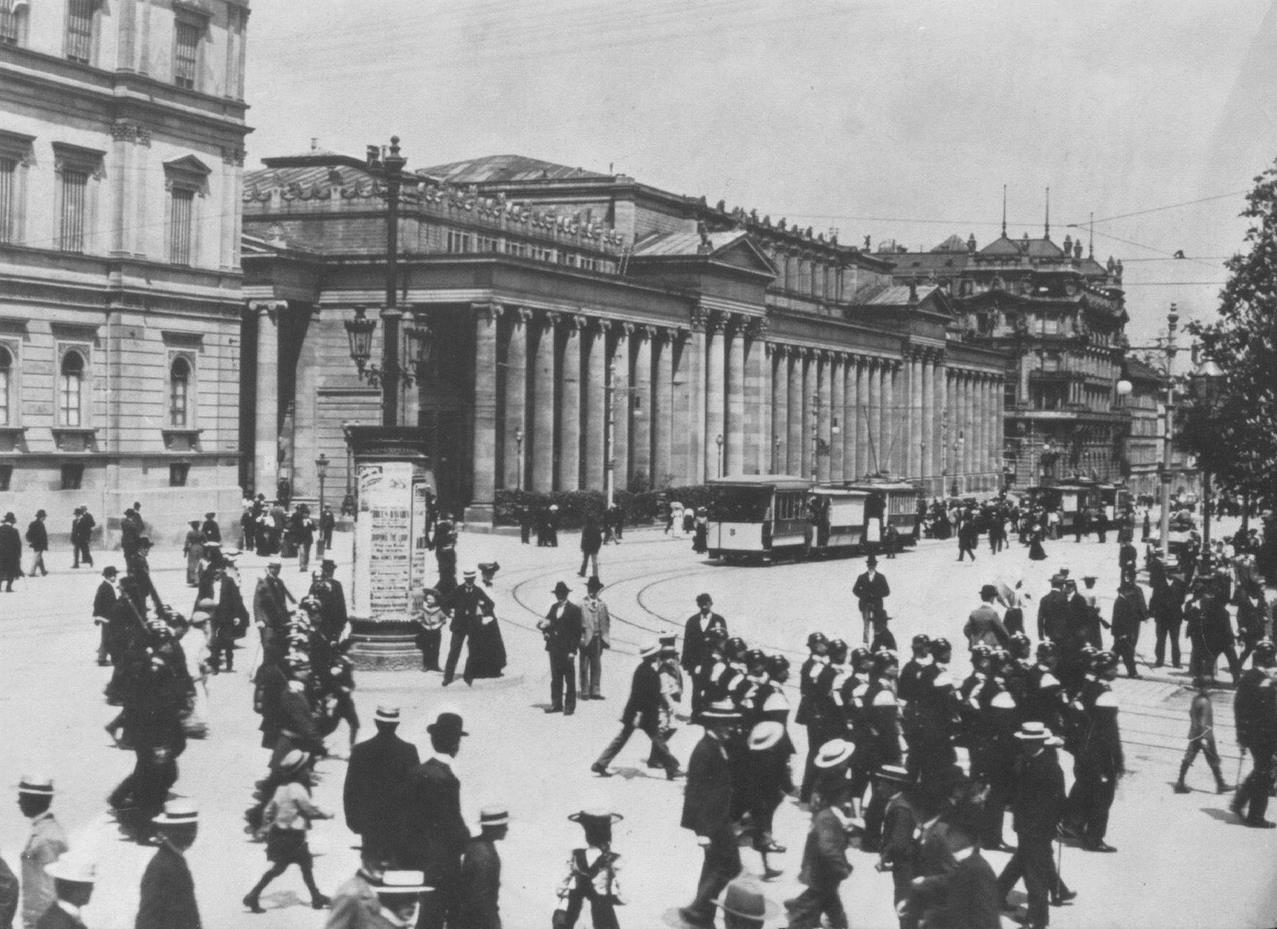
Stuttgart
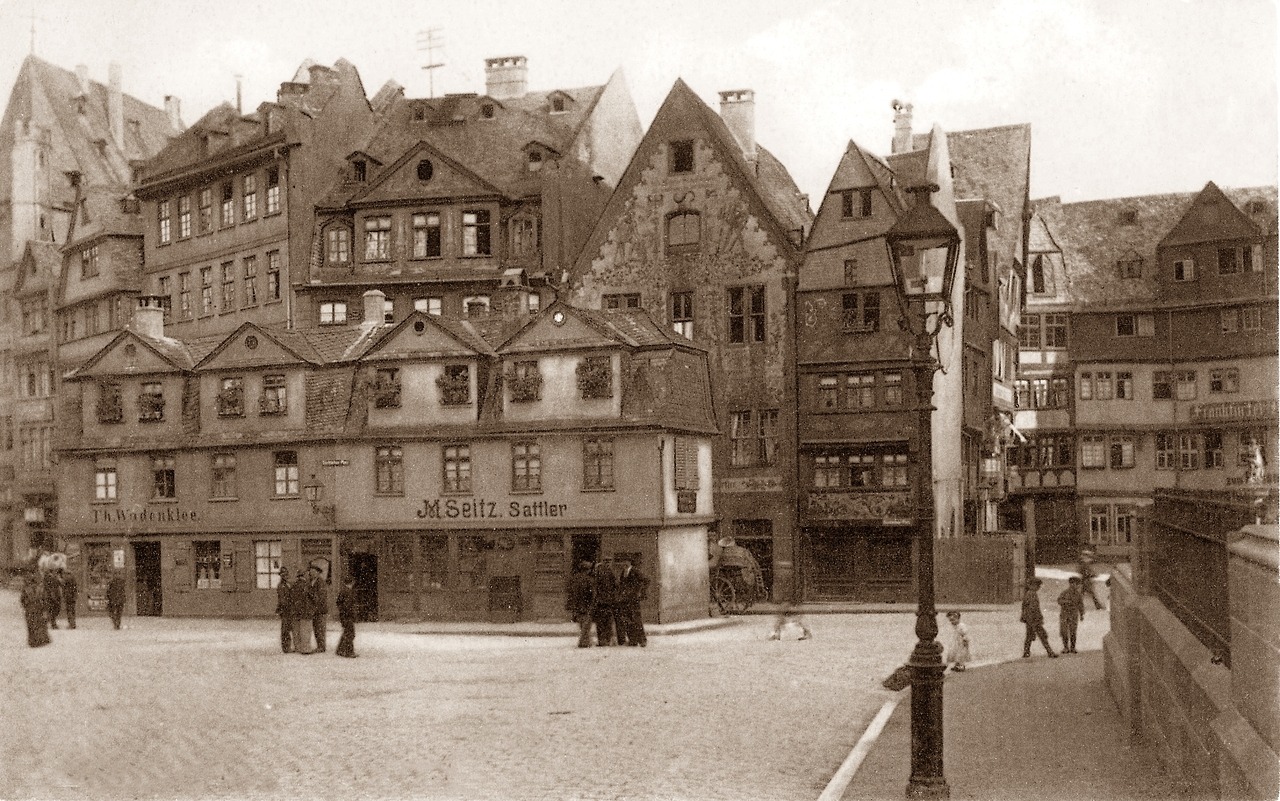
Frankfurt 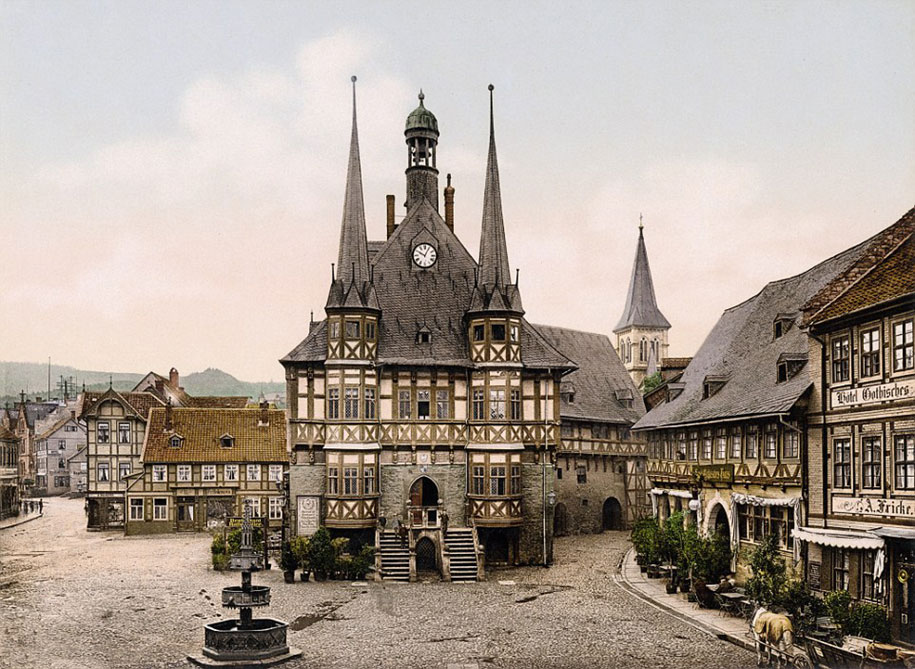
Wernigerode and its Town Hall
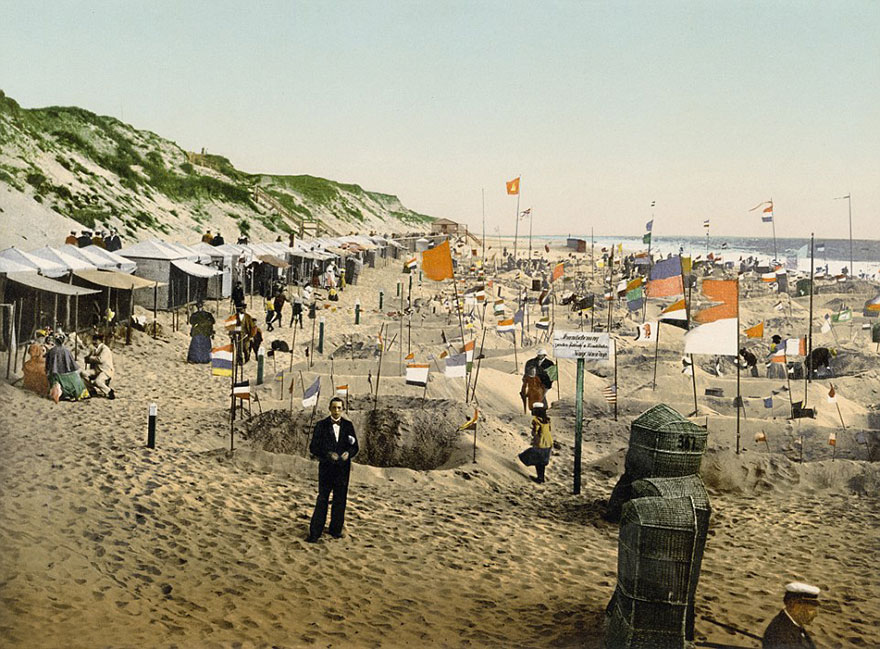
The German beach at Westerland
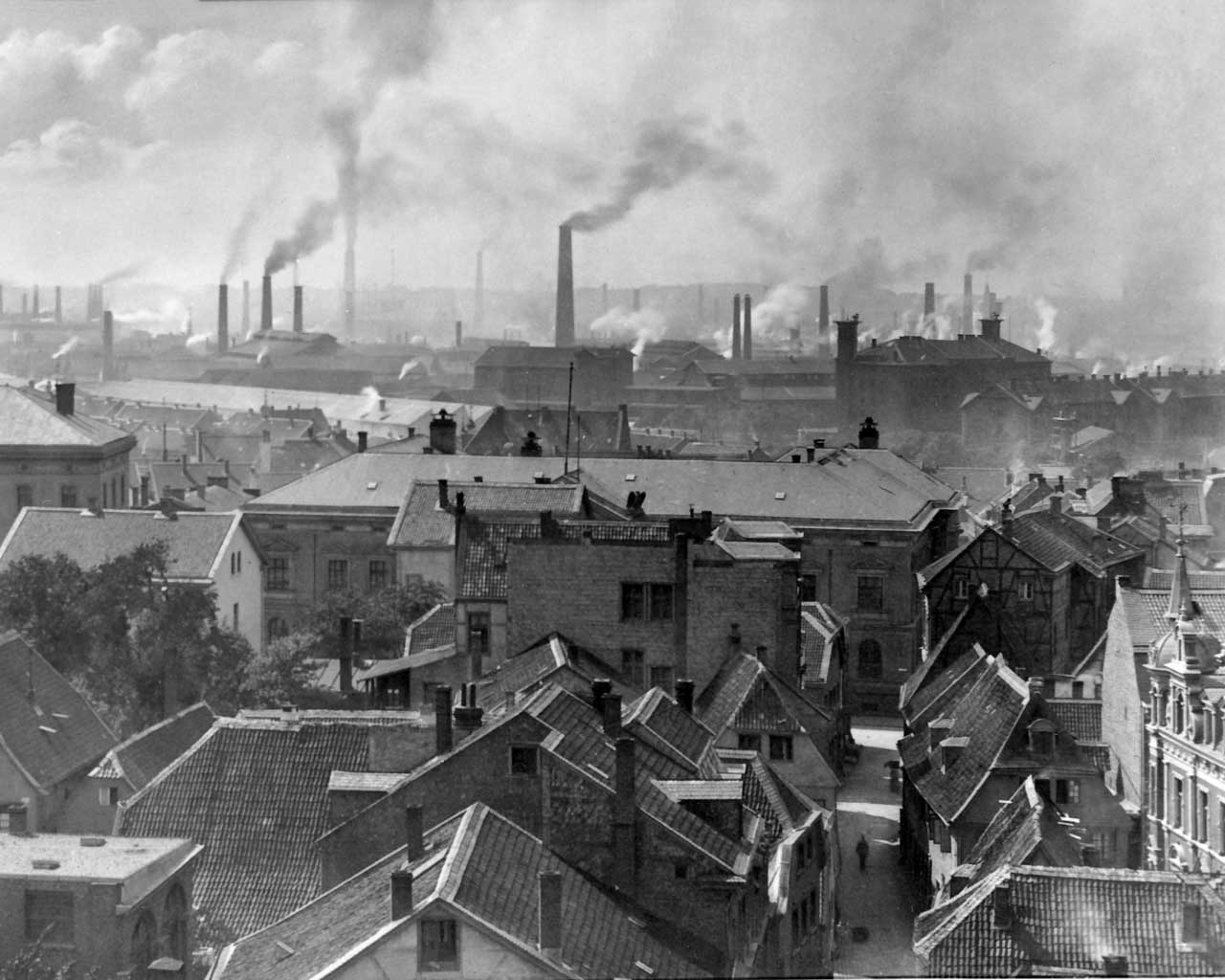
The Krupp Works in Essen

Go on to the next section: Austria-Hungary
 Miles
H. Hodges Miles
H. Hodges
| |


 The (Second) German Empire or Reich
The (Second) German Empire or Reich
 The Kulturkampf struggle between
The Kulturkampf struggle between Bismarck and the Social Democrats
Bismarck and the Social Democrats Wilhelm and the shift in German foreign
Wilhelm and the shift in German foreign Germany ... around the year 1900
Germany ... around the year 1900



















